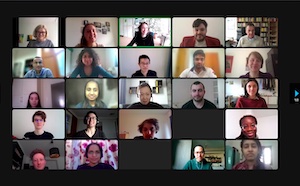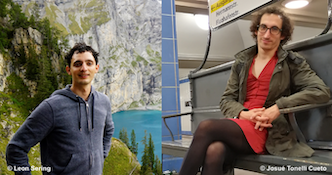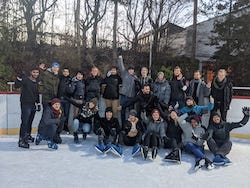
|
BMS-BGSMath Junior Meeting in Barcelona 2022We are delighted that the BMS-BGSMath Junior Meeting took place at the University of Barcelona this year from 05 to 07 September after it had been postponed due to the ongoing Corona pandemic. Around 80 participants attended this year’s meeting in Spain. Prof. John M. Sullivan of TU Berlin represented the BMS as one of its Deputy Chairs. The Berlin Mathematical School (BMS) and the Barcelona Graduate School of Mathematics (BGSMath) alternatively organize regular meetings as both schools share their ambitions to conduct excellent doctoral and postdoctoral training programs. They cooperate in developing initiatives to promote the mobility of and exchange between students and faculty members through events like the Junior Meeting, joint Summer Schools, mutual visits by advanced students and postdocs of each institution, and other scientific activities. The Junior Meeting also aims to intensify current collaborations and create new links between the two schools. The scientific sessions were focused on different areas of Mathematics, trying to cover a wide range of topics and be of interest to all the participants. No previous background in a specific area was required to attend and understand the talks.
Following the usual rotating principle, the next BMS-BGSMath Junior Meeting will be held in Berlin in 2023. BMS PhD student Sofía Garzón Mora described her impressions of the meeting: “During the past 5-7th of September, the BMS-BGSMath Junior Meeting took place at the historical building of the University of Barcelona. Almost 50 participants from Berlin attended this short yet very fruitful workshop, where the Barcelona organizers and participants joyfully welcomed us. The schedule was packed with plenary talks by invited senior speakers and junior researcher talks, distributed in parallel sessions by content throughout the day. This diversity in mathematical subjects was the perfect opportunity to attract those in the audience with an affinity towards some topics and invite more in-depth discussions and questions. The coffee and lunch breaks were an important addition to the program, where we enjoyed local delicacies while continuing to get to know our colleagues. Last but not least, the evening allowed us to delight ourselves with Mediterranean food during the Conference Dinner and go for a relaxing swimming session at the Barceloneta beach, where we enjoyed the last days of summer under the scorching Spanish sun. Adios Barcelona, we already look forward to participating in the next junior meeting.”
Best DMV Student Talks from two BMS StudentsAnastasija Pešić (HU Berlin) and Jonas Köppl (FU Berlin) participated in this year's student conference organized by the DMV and both won the prize for the best talks of the conference. Congratulations! We are very proud that the two winning talks were given by two BMS students. Anastasija Pešić did her Bachelor's degree at the University of Belgrade before she came to the BMS as a Phase I student in 2019. She is pursuing her dissertation research with Barbara Zwicknagl at HU Berlin. Jonas Köppl did his Bachelor's degree in Passau and also started BMS Phase I in 2019. After completing his Master's degree at TU Berlin he is now working with Péter Koltai at FU Berlin. Again, congratulations to Anastasija and Jonas!
BMS Certificate Ceremony & MATH+ Dissertation AwardsAfter a two-year break, MATH+ and its Graduate School, the BMS, were finally able to honor its graduates and recent BMS alumni with a festive certificate ceremony in the beautiful and traditional Leibniz-Saal of the Berlin-Brandenburgische Akademie der Wissenschaften (BBAW). Almost 140 members and guests followed the invitation and enjoyed a wonderful afternoon and long overdue get-together. The afternoon started at 13:00 with the BMS PhD seminar “What is…?“. PhD student M. Levent Dogan introduced the topic of the following MATH+ Friday colloquium on “P, NP, and Probabilistically Checkable Proofs”, held by Irit Dinur of the Weizmann Institute of Sciences. The presentations were part of the 2022 nationwide event series of “The 7 Greatest Adventures of Mathematics” that focuses on the description of the seven Millennium Prize problems presented by seven German mathematical research institutions. The recordings of the presentations on "P versus NP" are available on the MATH+ YouTube channel. At 16:00, MATH+ Chair Christof Schütte welcomed everyone to the Certificate Ceremony and gave a laudation of the MATH+ Dissertation Award winners from 2020 and 2021, a prize first initiated in 2020. Dr. Josué Tonelli-Cueto (2020), Dr. Lena Walter (2021), and Dr. Paul Hager (2021) were present to proudly receive their Dissertation Award certificates. Congratulations to all of them! Also, congratulations to Dr. Leon Sering (2020) and Dr. Ander Lamaison Vidarte (2021), who unfortunately couldn’t participate in the ceremony.
The next laudation was given by BMS Co-Chair Holger Reich, who announced the Phase I graduates of recent years, followed by the laudation for the Phase II graduates by BMS Chair Jürg Kramer.
Bright sunflowers, which were presented along with the certificates, created a sunny atmosphere. Photos were taken with happy, laughing BMS alumni in groups, with their supervisors, and with their loved ones. Between the certificate presentations, the Klezmeyer Band provided beautiful musical entertainment with their joyful and yet solemn music.
The evening closed with a lively reception and summer party that was the perfect opportunity to meet everyone, talk about science, and exchange memories, with the graduates and the entire MATH+ community.
MATH+ Fellowships for Ukrainian mathematiciansThe Berlin Mathematics Research Center MATH+ is offering support for mathematicians from academic institutions in Ukraine that have recently left the country due to the ongoing Russian attack on Ukraine. The special fellowship program is an offer for refugees from Ukraine in the Berlin area that hold a master’s degree or higher in mathematics or a closely related field and have pursued mathematical research at a university or other academic institution in Ukraine within the past year (exceptions to this one-year rule may apply due to parental leave etc.). The aim of the program is to enable refugees to continue their research and start new collaborations at one of the mathematics institutes of the universities FU Berlin, HU Berlin, and TU Berlin, as well as the non-university institutes Weierstrass Institute for Applied Analysis and Stochastics (WIAS) and Zuse Institute Berlin (ZIB). For details please visit: https://mathplus.de/news/math-support-for-mathematicians-from-ukraine/ BMS Days and BMS Student Conference: 21-25 February 2022Usually, selected BMS applicants are invited to travel to Berlin to participate in the BMS Days – an important annual BMS event to recruit promising young scientists. However, due to the ongoing pandemic, the BMS Days took place online for the second time, from 21-22 February 2022. This year’s online format presented new activities in a mixture of zoom talks, poster sessions, and virtual interactive encounters via the meetingland event platform. The purpose of the BMS Days was only for the applicants to get to know the BMS. The invited applicants were introduced to the graduate school’s program and had the opportunity to ask questions about living and studying in Berlin.
40 Phase I and 4 Phase II applicants from 15 countries attended in different time zones and therefore in two groups. On the first day, the students received an overview of the BMS program and the students’ life in Berlin. This was followed by group meetings where applicants had the chance to ask the BMS students, faculty members, and office staff questions in a smaller, more informal settings. To conclude the day, the BMS Student Representatives arranged an online game. The second day gave an insight into different mathematical research topics. The lectures were given by Claudia Schillings (currently at the University of Mannheim), who will start as the new MATH+ professor at FU Berlin in March, on “Uncertainty Quantification and Inverse Problem” and Thomas Walpuski of HU Berlin on “Invariants of manifolds arising from partial differential equations”. Both talks were preceded by the student-run “What is…?” seminars to give the audience a basic introduction. Afterwards, the applicants had the chance to meet BMS postdocs and PhD students in a poster session and learn about their research experiences. As always, the BMS Days were followed by the BMS Student Conference from 23-25 February. The main goals of the Student Conference are to connect both current and prospective students and help prospective students get to know the mathematical landscape in Berlin and the social environment at the BMS. Additonally, two invited talks were given by Chris Wendl (HU Berlin) and Peter Schröder (Caltech). Despite the great virtual experiences and opportunities to get to know each other, the BMS hopes to welcome the next group of applicants in person again in 2023. MATH+ Dissertation Awards 2020In cooperation with the Einstein Foundation Berlin, the Berlin Mathematical School (BMS) of the Cluster of Excellence MATH+ awards up to three annual prizes for outstanding dissertations to BMS graduates. We are delighted to announce that the first MATH+ Dissertation Awards have been presented to Dr. Leon Sering and Dr. Josué Tonelli Cueto. Congratulations!
Both award winners graduated from Technische Universität Berlin as members of the Berlin Mathematical School (BMS), the graduate school of MATH+. In 2017, Leon Sering moved to Berlin for his doctorate. Under the supervision of Martin Skutella, he was part of the COGA research group (Combinatorial Optimization & Graph Algorithms) and became a member of the Berlin Mathematical School (BMS). After completing his doctorate with Summa Cum Laude based on his thesis “Nash Flows Over Time” and his oral defense in 2020, Leon Sering is now working as a postdoctoral researcher at ETH Zurich in Rico Zenklusen's group. Josué Tonelli Cueto joined the BMS in 2014 as a Phase I student. In 2017, he received a grant from the Einstein Foundation for his doctoral studies, supervised by Peter Bürgisser (TU Berlin) and Felipe Cucker (City University of Hong Kong). In 2019, he was awarded the doctoral degree from TU Berlin with Summa Cum Laude for his thesis on “Condition and Homology in Semialgebraic Geometry” and oral defense. Moreover, his dissertation won the 3rd Prize in the Tiburtius Prizes 2020 of the State of Berlin. Currently, Josué Tonelli Cueto has a postdoc position at INRIA Paris and the IMJ-PRG under the mentorship of Fabrice Rouillier and Elias Tsigaridas. Read more about the two award winners and their excellent dissertations New BMS Student Representatives 2024Each year in November, the BMS students elect a new team of BMS Student Representatives for one year. We are delighted to announce this year’s new team: Sophia Bugarija, Apratim Choudhury, Fawzy Hegab, Lea Strubberg and Bálint Zsigri. The new team will start their term in December, while the recent BMS Student Representatives - Gerard, Saraí, Owen, Duc, Nicolas and Berk - are busy organizing the BMS Student Conference 2024 (to take place on 21 - 23 February 2024). In general, the BMS Student Representatives have two main tasks: They serve as a contact between the BMS students and the BMS administration and help BMS students to connect with each other. In addition, they represent the BMS students on various official committees and can voice students' concerns and suggestions there. The representatives try to notice needs and also organize an annual survey to find out about the issues and concerns of the BMS students. To help BMS students get to know each other and provide opportunities for networking, they offer a wide range of activities like At the end of the winter semester, the team is also in charge of organizing the annual BMS Student Conference, right after the BMS Days. You can contact the BMS student representatives at <This email address is being protected from spambots. You need JavaScript enabled to view it.>. New BMS Student RepresentativesEach year in November, the BMS students elect a new team of BMS student representatives for one year. We are delighted to announce this year’s new team: Aizhan Issagali, Coco Bögel, Dante Luber, Lenny Leass, Margarita Kostré, and Marwa Zainelabdeen. The new team will start their term in December, while the recent BMS student representatives - Andrei, Paramjit, Sandro, Sofía, Tatiana, and Vira - will still be responsible for the Career Day on 10 December 2021 and for the student conference in 2022. In general, the BMS student representatives have two main tasks: They serve as a contact between the BMS students and the BMS administration and help BMS students to connect with each other. In addition, they represent the BMS students on various official committees and can voice students' concerns and suggestions there. The representatives try to notice needs and organize an annual survey of BMS students. To help BMS students get to know each other and provide opportunities for networking, they offer a wide range of activities like BMS students ice-skating | © Vira Raichenko At the end of the winter semester, the team is also in charge to organize the annual BMS student conference, right after the BMS Days, You can contact the BMS student representatives at <This email address is being protected from spambots. You need JavaScript enabled to view it.>. Honoring Jürg KramerMATH+ takes this opportunity to wish Jürg Kramer all the best for a happy 65th birthday! His outstanding commitment to Berlin mathematics and to young mathematicians within MATHEON, the Berlin Mathematical School (BMS), DZLM and MATH+ make him one of our most highly valued members. 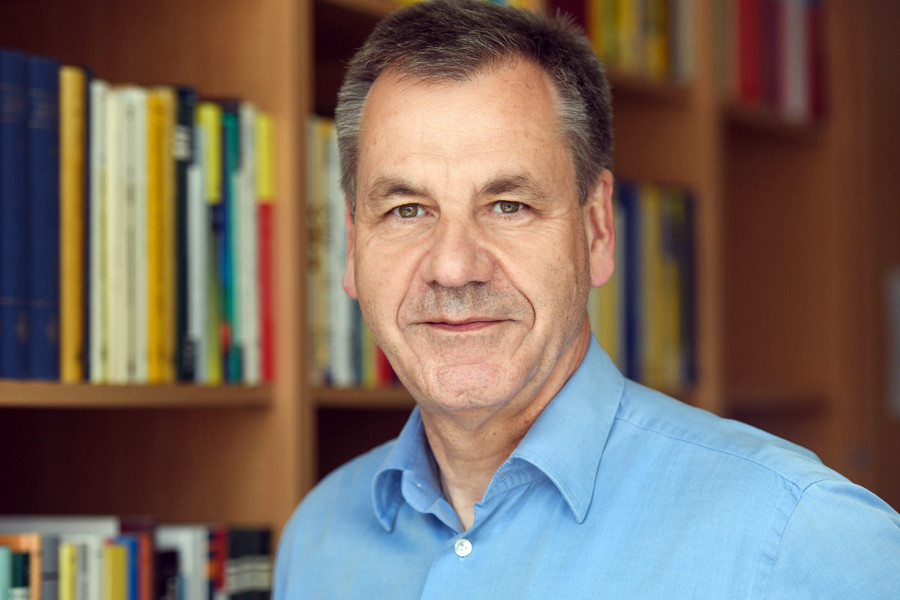
Born in Switzerland on 3 June 1956, he started his mathematical career at the University of Basel, where he got his diploma in mathematics with minors in physics and astronomy in 1980 and received his doctorate under Martin Eichler in 1985. Postdoc positions took him to the Max Planck Institute for Mathematics in Bonn, to Harvard University, the MSRI, Universität Wuppertal, and to ETH Zurich, where he completed his habilitation in 1993. In 1994, he accepted the offer of a professorship at Humboldt-Universität zu Berlin (HU Berlin). After his arrival in Berlin, Jürg Kramer soon took on essential leadership roles. He was deputy director and director of the Institute of Mathematics at HU Berlin from 1998 to 2008. A member of the DFG Research Center Matheon since its founding in 2002, he served on the MATHEON Executive Board from 2007 to 2014. He was also one of the founding fathers of the Berlin Mathematical School (BMS) and has served as chair or co-chair since 2006. In 2013, he was one of the initiators of the Einstein Center for Mathematics ECMath, where he also served on the Executive Board. From 2013 to 2014, Jürg Kramer served as President of the German Mathematical Society (DMV). He is a member of the European Mathematical Society, the Academia Europea, Acatech, and INNOMATH – a European initiative to support highly gifted high school students. 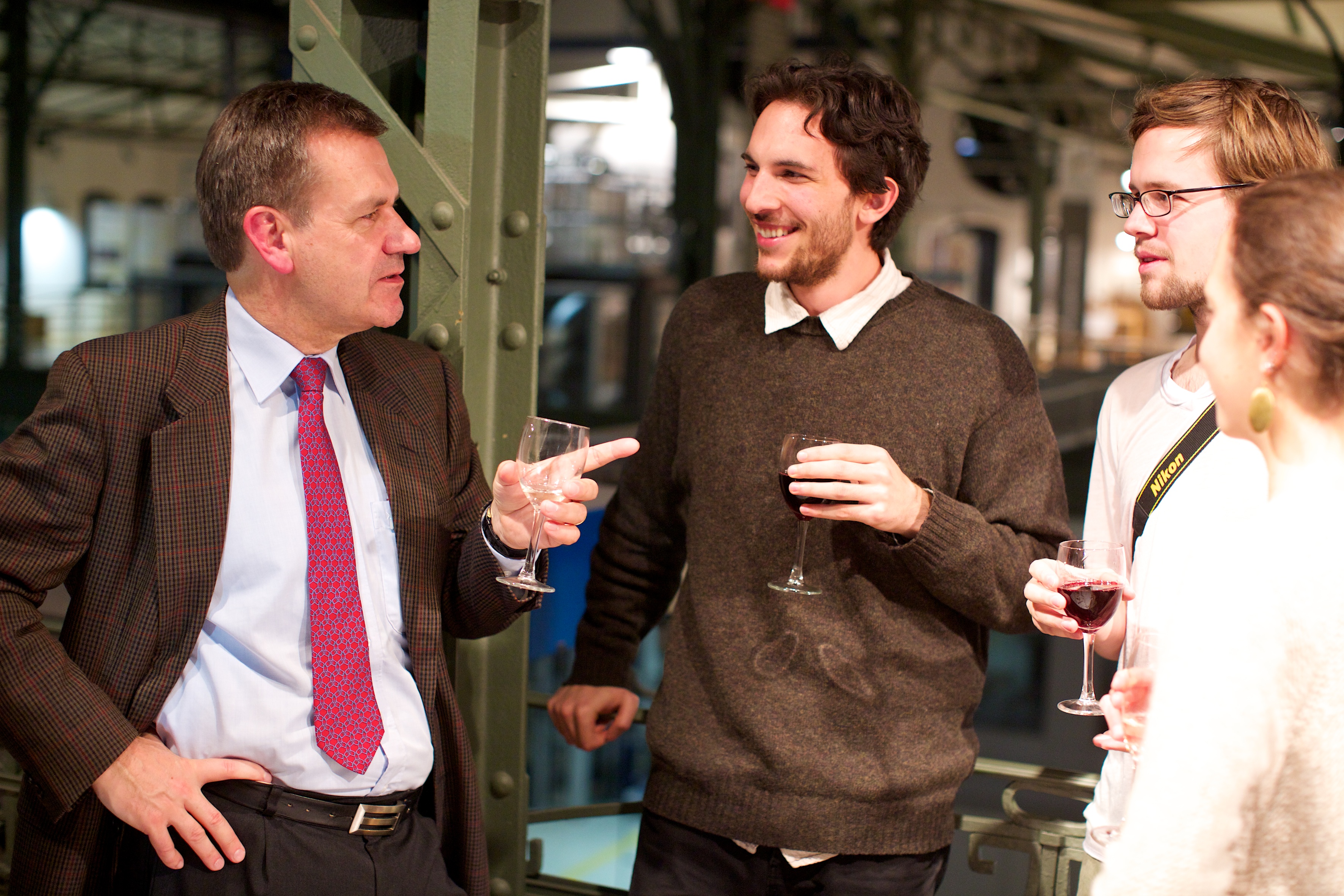
Throughout his career, Jürg Kramer has been devoted not only to mathematics itself but also to the education and training of mathematics teachers and the advancement of mathematically talented and interested school pupils, students, and teachers – from elementary schools to doctoral researchers. Moreover, his research group aims to make current mathematical developments accessible to the public at large. This commitment is expressed in his engagement in the Berlin network of STEM schools at HU Berlin (Berliner Netzwerk mathematisch naturwissenschaftlicher Schulen) as well as his support for the “Mathematical Kangaroo” (Känguru der Mathematik), the largest international mathematics competition for school children, which is based at the Institute of Mathematics at Humboldt-Universität zu Berlin. In 2010, a group of experts convened by the Deutsche Telekom Foundation (DTS) proposed a national advanced training center for mathematics as an important building block in its recommendations on Mathematik entlang der Bildungskette (“Mathematics along the educational chain”). As a result, the DTS issued a call for applications providing funding for five years to establish such a center. Based on his project Mathematik anders machen (“Doing Mathematics Differently”) Jürg Kramer organized a consortium of universities, which submitted the winning proposal. Thus, the Deutsches Zentrum für Lehrerbildung Mathematik (DZLM) was founded in October 2011. Jürg Kramer has been the Director of DZLM since the beginning and saw the DZLM find a permanent home as part of a new department Fachbezogener Erkenntnistransfer (“Subject-Specific Transfer of Knowledge”) of the Leibniz Institute for Science and Mathematics Education (IPN) Kiel in 2020. He is now director of the department. The success story of DZLM would have been impossible without Jürg Kramer’s experience in large collaborative projects like MATHEON, BMS, ECMath, and MATH+, his strong commitment, his excellent networking and communication skills and not least at all his personality and respectful attitude to other people. In addition to his numerous engagements, Jürg Kramer is also an outstanding researcher, with interests in number theory, automorphic forms, and arithmetic geometry. He chaired two DFG Research Training Groups Arithmetic and Geometry (2004-2009) and Moduli and Automorphic Forms (2012-2016). Anna von Pippich elaborates on Jürg Kramer’s research. 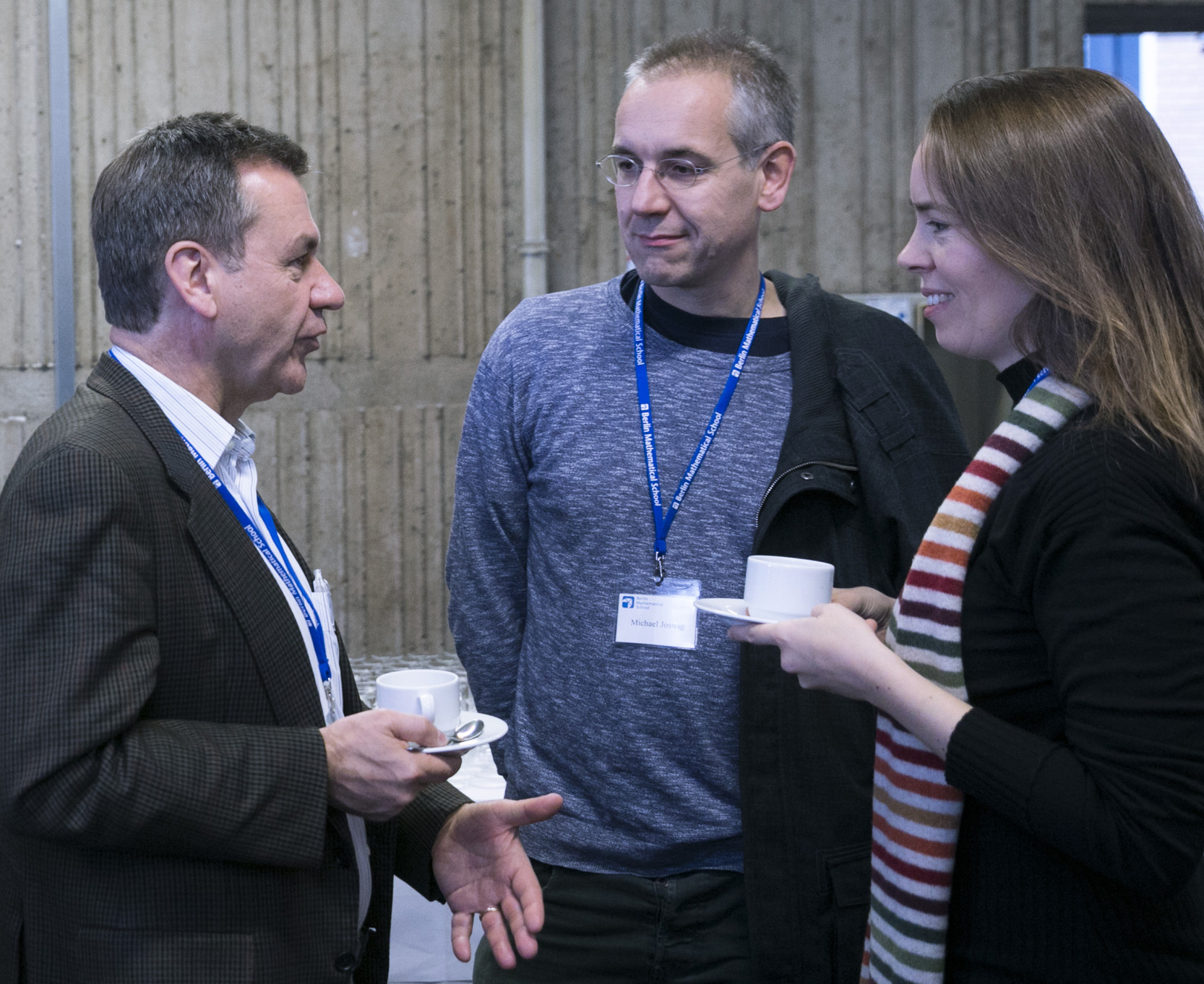
Last but not least, Jürg Kramer is a key member of the Berlin Mathematics Research Center MATH+ and contributed an important part to the successful application for MATH+ in the framework of the German Excellence Strategy. With all his energy and commitments, Jürg Kramer has significantly contributed to the shape of the mathematical landscape in Berlin and has helped to make it an internationally attractive destination for study and research. Due to his efforts, there are many mathematicians around the world who owe their education to Berlin mathematics! Dear Jürg, MATH+ wishes you a happy birthday and we look forward to working together on many more activities!
Anna von Pippich on Jürg Kramer’s Research
ERC Advanced Grant for Faculty Member Bruno KlinglerOn 22 April 2021, the European Research Council (ERC) announced which innovative research projects will be funded by the ERC Advanced Grant for established researchers. Out of 2678 proposals from across Europe and all scientific disciplines, only 209 projects (8%) were approved; these projects will be funded with in total 507 million euro over a five-year period. The project “Tame geometry and transcendence in Hodge theory” (TameHodge) by Bruno Klingler will be funded by the ERC with more than 1.8 million euro. The project plans to attack fundamental questions in Hodge theory using tools coming from mathematical logic.
Recent work of Prof. Klingler and his collaborators has shown the emergence of a spectacular link between Hodge theory and tame geometry. Tame geometry, whose possibility was suggested by Grothendieck in the 1980s and developed by logicians under the name o-minimal geometry, studies structures where every definable set has a finite geometric complexity. The goal of the project TameHodge is to show that moderate geometry is the natural framework for Hodge theory—with major applications to the transcendence of periods, atypical intersections, and non-abelian Hodge theory. Since 2017, Bruno Klingler is professor for Algebraic Geometry at Humboldt-Universität zu Berlin; as such he is one of 20 Einstein professors. Furthermore, Prof. Klingler is a MATH+ member and a faculty member of the Berlin Mathematical School. Before moving to Berlin, Bruno Klingler was a full professor at the Institut de Mathématiques de Jussieu-Paris Rive Gauche (IMJ-PRG), Université Paris, as well as assistant professor at University of Chicago and Yale University. Read more: MATH+ press information in English and German.
|


















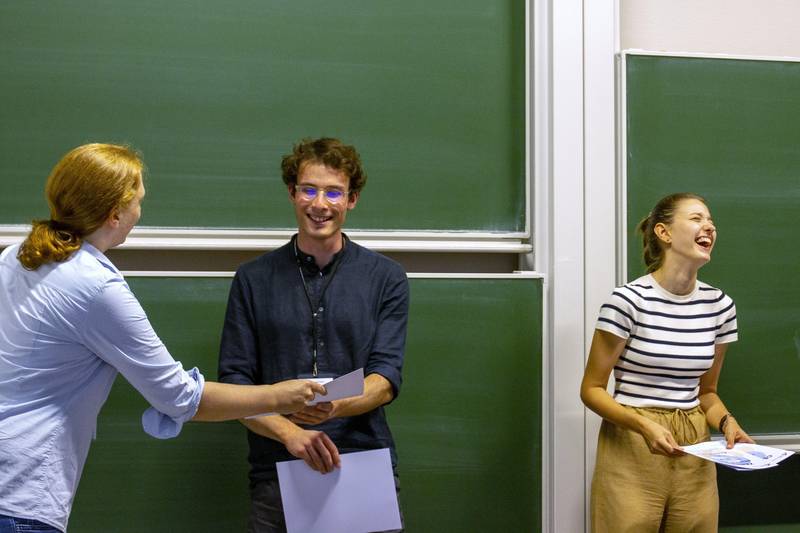 © privat
© privat
